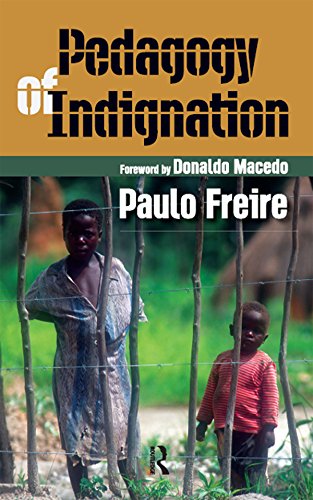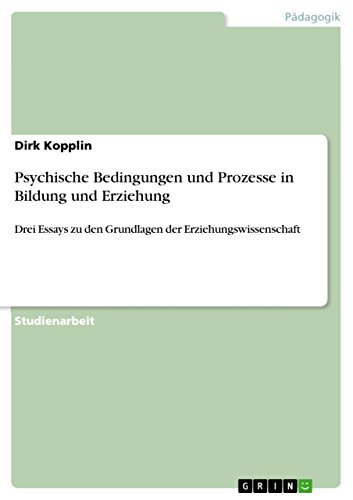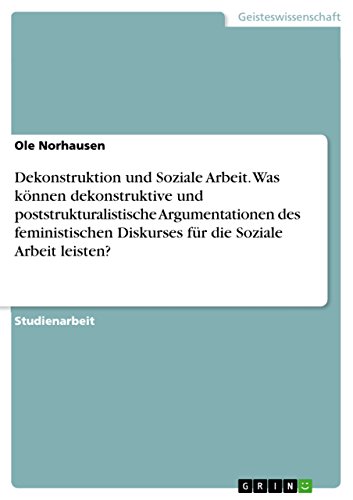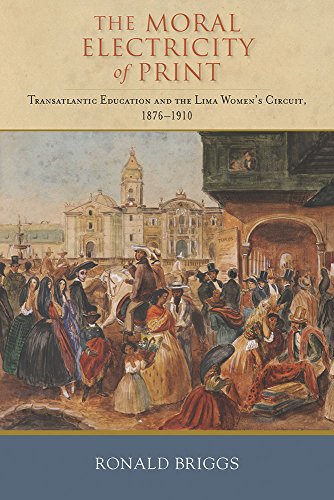
By Paulo Freire
ISBN-10: 1594510504
ISBN-13: 9781594510502
ISBN-10: 1594510512
ISBN-13: 9781594510519
Read or Download Pedagogy of Indignation (Series in Critical Narrative) PDF
Best education theory_1 books
(sponsored via the tutorial Statisticians, SIG)Multilevel Modeling of academic information, co-edited by way of Ann A. O’Connell, Ed. D. , and D. Betsy McCoach, Ph. D. , is the subsequent quantity within the sequence: Quantitative equipment in schooling and the Behavioral Sciences: concerns, learn and educating (Information Age Publishing), backed by means of the tutorial Statisticians' unique curiosity workforce (Ed-Stat SIG) of the yankee academic study organization.
Download PDF by Dirk Kopplin: Psychische Bedingungen und Prozesse in Bildung und
Studienarbeit aus dem Jahr 2015 im Fachbereich Pädagogik - Wissenschaft, Theorie, Anthropologie, word: 1,0, Universität Hamburg (Fachbereich Erziehungswissenschaft), Veranstaltung: Psychische Bedingungen und Prozesse in Bildung und Erziehung, Sprache: Deutsch, summary: Diese Modulabschlussprüfung enthält drei wissenschaftliche Essays, die sich mit Grundlagen der Erziehungswissenschaft befassen und in erster Linie für werdende Lehrerinnen und Lehrer von Interesse sein dürften.
Studienarbeit aus dem Jahr 2015 im Fachbereich Sozialpädagogik / Sozialarbeit, notice: 1,0, Leuphana Universität Lüneburg (Institut für Sozialpädagogik), Veranstaltung: Gender reports als Bezugsdisziplin der Sozialpädagogik, Sprache: Deutsch, summary: Die vorliegende Arbeit geht der Frage nach, used to be dekonstruktive und poststrukturalistische Argumentationen des feministischen Diskurses für die Soziale Arbeit leisten können und in welche Richtung dies den Theoriediskurs Sozialer Arbeit beeinflussen kann.
The Moral Electricity of Print: Transatlantic Education and by Ronald Briggs PDF
Ethical electricity—a time period coined through American transcendentalists within the 1850s to explain the strength of nature that used to be literacy and schooling in shaping a better society. this idea wasn't strictly an American thought, after all, and Ronald Briggs introduces us to at least one of the best examples of this energy: the literary scene in Lima, Peru, within the 19th century.
- Computer Assisted Learning '83: Selected Proceedings from the Computer Assisted Learning 83 Symposium held on 13-15 April 1983 at the University of Bristol: ... CAL'83 Symposium (Computers and Education)
- Using Data to Improve Learning: A practical guide for busy teachers
- Tiergestützte Interventionen in der Sozialen Arbeit: Wie der Einsatz eines Therapiebegleithundes Kindern und Jugendlichen helfen kann (German Edition)
- Bedeutung der Elternarbeit bei hyperaktiven Kindern: Psychosoziale Belastungsfaktoren von Eltern, deren Kind von ADHS betroffen ist und mögliche Hilfestellungen ... durch die Sozialarbeit (German Edition)
Additional resources for Pedagogy of Indignation (Series in Critical Narrative)
Sample text
Pedagogy of Indignation (Series in Critical Narrative) by Paulo Freire
by Robert
4.5



